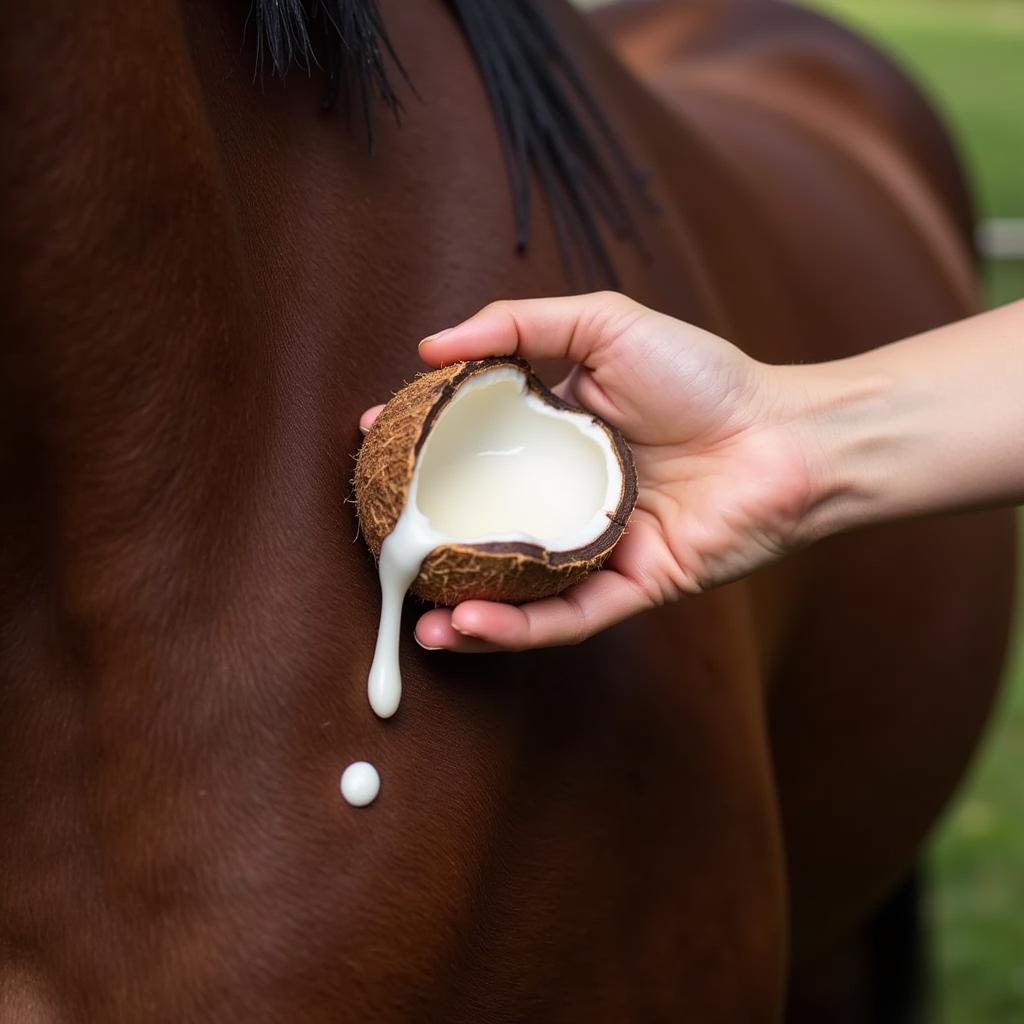If your horse is constantly scratching and rubbing, it might be suffering from itchy skin. This common problem can be caused by a variety of factors, from dry weather to allergies to parasites. Choosing the right Horse Shampoo For Itchy Skin can help to alleviate your horse’s discomfort and promote a healthy, shiny coat.
 Horse Scratching Itchy Skin
Horse Scratching Itchy Skin
Understanding the Causes of Itchy Skin in Horses
Before choosing a shampoo, it’s important to understand what’s causing your horse’s itchy skin. Common culprits include:
- Dry skin: Just like humans, horses can experience dry skin, especially during the winter months or in arid climates.
- Allergies: Horses can be allergic to a variety of things, including pollen, mold, and insect bites.
- Parasites: Mites, lice, and other parasites can cause intense itching in horses.
- Rainscald and other fungal infections: These skin conditions thrive in warm, humid weather and can cause itchy, scaly patches.
Choosing the Right Horse Shampoo for Itchy Skin
Once you have an idea of what might be causing your horse’s itchy skin, you can start looking for a shampoo. Here are some things to keep in mind:
-
Ingredients to look for:
- Oatmeal: Known for its soothing properties, oatmeal can help to calm irritated skin.
- Aloe vera: This plant extract has anti-inflammatory and moisturizing properties that can benefit itchy, dry skin.
- Chlorhexidine: This antiseptic ingredient can help to control bacterial and fungal growth, making it useful for conditions like rainscald. You can find out more about chlorhexidine shampoo for horses on our website.
- Essential oils: Some essential oils, such as tea tree oil and lavender oil, have antifungal and antibacterial properties. However, it is important to use essential oils with caution as some can be toxic to horses.
-
Ingredients to avoid:
- Harsh detergents: These can strip away the skin’s natural oils, making itching and dryness worse.
- Artificial fragrances and colors: These can be irritating to sensitive skin.
Tips for Bathing a Horse with Itchy Skin
- Consult your veterinarian: Before using any new shampoo on your horse, it is always best to consult with your veterinarian. They can help you determine the cause of your horse’s itchy skin and recommend the best course of treatment.
- Use lukewarm water: Hot water can dry out the skin.
- Apply shampoo to a wet coat and work into a lather: This will help to distribute the shampoo evenly.
- Rinse thoroughly: Any leftover shampoo can irritate the skin.
- Avoid getting shampoo in the horse’s eyes or mouth.
- Dry the horse thoroughly: This is especially important in cold weather.
“When dealing with itchy skin, it’s crucial to address the root cause rather than just treating the symptoms,” says Dr. Emily Carter, a veterinarian specializing in equine dermatology. “A comprehensive approach involving proper diagnosis, targeted treatment, and a balanced diet is essential.”
Natural Remedies for Horse Itchy Skin
In addition to using a medicated shampoo, there are a few natural remedies that can help to soothe your horse’s itchy skin:
- Coconut oil: Horses and coconut oil can be a winning combination. This natural oil is a great moisturizer and can help to soothe irritated skin.
- Apple cider vinegar: A diluted solution of apple cider vinegar (1 part vinegar to 10 parts water) can help to restore the skin’s natural pH balance and relieve itching.
- Oatmeal bath: Add a cup or two of uncooked oatmeal to a lukewarm bath and let your horse soak for 15-20 minutes.
 Applying Coconut Oil to Horse Coat
Applying Coconut Oil to Horse Coat
Preventing Itchy Skin in Horses
Prevention is always better than cure. Here are some tips to help prevent itchy skin in your horse:
- Groom regularly: This helps to remove dirt, debris, and loose hair, all of which can irritate the skin.
- Provide a balanced diet: A healthy diet supports a healthy coat and skin.
- Control parasites: Use a veterinarian-recommended parasite control program year-round.
- Provide access to shade and shelter: This will help to protect your horse from the sun and wind, both of which can dry out the skin.
When to See a Vet
While many cases of itchy skin in horses can be managed with over-the-counter shampoos and home remedies, it is important to see a veterinarian if:
- Your horse’s itching is severe or does not improve with home treatment.
- Your horse has open sores or other signs of infection.
- Your horse is losing hair.
- Your horse seems to be in pain.
Your veterinarian can determine the underlying cause of your horse’s itchy skin and recommend the best course of treatment, which may include prescription medications such as Vetrolin horse shampoo or best antifungal shampoo for horses.
By understanding the causes of itchy skin and choosing the right horse shampoo, you can help your equine friend enjoy a healthy, itch-free coat.
FAQ
Q: Can I use human shampoo on my horse?
A: No, it is not recommended to use human shampoo on horses. Human shampoos are formulated for human skin and hair, which have a different pH balance than horses. Using human shampoo on your horse can strip away the natural oils from their skin, leading to dryness, irritation, and even skin infections.
Q: How often should I bathe my horse with itchy skin?
A: The frequency of bathing depends on the severity of the itching and the type of shampoo you are using. It is best to consult with your veterinarian for specific recommendations. Over-bathing can strip the natural oils from the skin, so it is important to find a balance.
Q: What is the best way to prevent my horse from getting itchy skin?
A: Preventing itchy skin starts with proper grooming, a balanced diet, year-round parasite control, and providing access to shade and shelter.
Q: When should I be concerned about my horse’s itchy skin?
A: You should consult a veterinarian if your horse’s itching is severe, doesn’t improve with home treatment, or is accompanied by open sores, hair loss, or signs of pain.
Need more help with your itchy horse? Contact our expert team at Justus Horses USA. Call us at 0772127271, email us at [email protected] or visit us at QGM2+WX2, Vị Trung, Vị Thuỷ, Hậu Giang, Việt Nam. We’re here to support you 24/7.